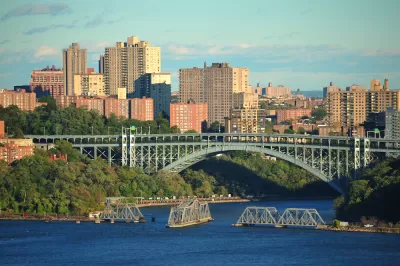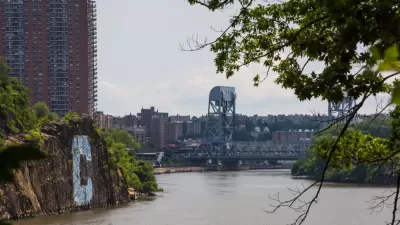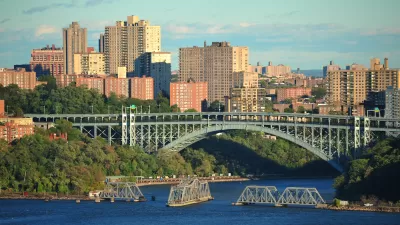New York City is appealing a judge's decision to toss the Inwood NYC Action Plan, approved by the city in 2018. Next City describes the racial justice implications of the court case and the plan.

"Black, indigenous and other people of color are fighting back against generations of structural violence waged against them based on race," writes Oscar Perry Abello.
The racial equity conversation in recent weeks has turned to matters of land use, as the discriminatory history of exclusionary zoning and car-centric planning has faced another round of criticism as tools of systemic racism. Abello reports on the ongoing legal controversy over the Inwood NYC Action Plan, approved in 2018, which serves as a reminder that ostensibly progressive zoning reform isn't necessarily a victory for racial and social justice:
They’re also fighting back in the New York State Appellate Division court, which last week heard oral arguments in a case where residents of the heavily Dominican immigrant Inwood neighborhood filed a lawsuit charging that the city should have followed their demand for a racial impact analysis before rezoning 240 acres of the neighborhood. The rezoning would allow developers to demolish existing residential, commercial and mixed-use buildings and replace them with even larger buildings, containing 4,348 additional housing units, about a third of which would be income-restricted, as well as adding 1.1 million square feet of commercial space to the neighborhood.
The city is appealing a previous court decision that overthrew the plan, which Crain's New York Business covered without mentioning the demand for a racial impact analysis. An article published by City Limits, however, noted the lack of demographic considerations undertaken by the environmental review for the plan.
Cheryl Pahaham—a longtime Inwood resident, a member of Northern Manhattan is Not for Sale, and co-defendant in the lawsuit seeking to overturn the plan—is quoted in the article saying that the complaints about the Inwood NYC Action Plan focus on process. If that's the case, the city has a long way to go, and not just in Inwood, to make amends. Abello cites a study by Elena Conte, deputy director of the Pratt Center for Community Development, that examined 14 different neighborhood-level rezonings approved in New York City from 2004 to 2019. "Conte found there was not a single instance where the city determined there would be any significant 'adverse environmental impact' from commercial displacement," according to Abello.
FULL STORY: Rezoning by the Book, When the Book Ignores Race

Planetizen Federal Action Tracker
A weekly monitor of how Trump’s orders and actions are impacting planners and planning in America.

Maui's Vacation Rental Debate Turns Ugly
Verbal attacks, misinformation campaigns and fistfights plague a high-stakes debate to convert thousands of vacation rentals into long-term housing.

Restaurant Patios Were a Pandemic Win — Why Were They so Hard to Keep?
Social distancing requirements and changes in travel patterns prompted cities to pilot new uses for street and sidewalk space. Then it got complicated.

In California Battle of Housing vs. Environment, Housing Just Won
A new state law significantly limits the power of CEQA, an environmental review law that served as a powerful tool for blocking new development.

Boulder Eliminates Parking Minimums Citywide
Officials estimate the cost of building a single underground parking space at up to $100,000.

Orange County, Florida Adopts Largest US “Sprawl Repair” Code
The ‘Orange Code’ seeks to rectify decades of sprawl-inducing, car-oriented development.
Urban Design for Planners 1: Software Tools
This six-course series explores essential urban design concepts using open source software and equips planners with the tools they need to participate fully in the urban design process.
Planning for Universal Design
Learn the tools for implementing Universal Design in planning regulations.
Heyer Gruel & Associates PA
JM Goldson LLC
Custer County Colorado
City of Camden Redevelopment Agency
City of Astoria
Transportation Research & Education Center (TREC) at Portland State University
Jefferson Parish Government
Camden Redevelopment Agency
City of Claremont




























